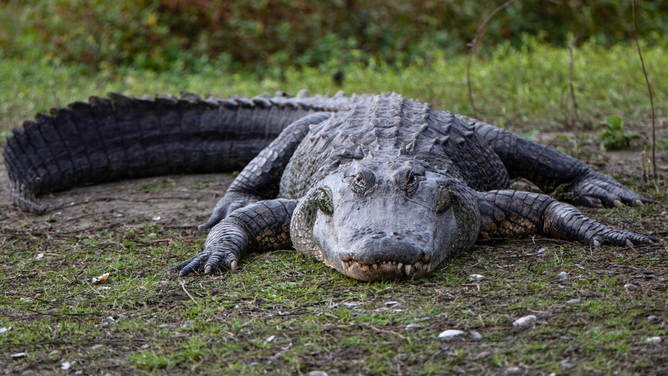It's Your Own Damn Fault If An Alligator Attacks You, Scientists Say
If you ever find yourself bitten or attacked by an alligator, new research suggests it was probably your fault.
In a new study published last week in the journal Human-Wildlife Interactions, researchers found that in 96% of recorded gator attacks, the human involved either wasn’t paying attention to his surroundings or did something risky that prompted the attack.
"I wondered if crocodilians had an unwarranted reputation for attacks the same way snakes do," said Mark Teshera, lead author of the study and a biology professor at Center College.
"It was important to create a ranking system for risky human behaviors because it showed that the overwhelming majority of bites stemmed from some level of humans engaging in risky behavior in places where alligators live. Therefore, we should not call these encounters 'attacks.'"

This dude is just waiting ro you to engage in some risky behavior.
(Getty Images)
This guy sounds like an alligator apologist to me.
SIGN UP for The Daily OutKick. New Look, Same Attitude.
To create the ranking system Teshera mentioned, researchers dug into the CrocBITE database and sifted records of human-alligator interactions from 1734 all the way up to 2021. The team then analyzed those records alongside news reports and investigations by wildlife agencies to determine whether the level of "human behavior risk" was low, moderate, high or none at all.
The scientists found that most bites and attacks followed moderate-risk behaviors, like swimming or wading in waters with known alligator inhabitants.
WATCH: Florida Hiker Stumbles Upon Massive Alligator Strolling Along Trail
But it's not a perfect science. For example, simply gardening or walking your dog near a pond would still put you at fault, according to these researchers' criteria.
By these standards, the only way they'd find an alligator at fault is if the reptile walked right up to your front porch and rang the doorbell.
And don't put that past 'em!
Although, in this case, the "risky behavior" would be opening the door for the alligator.
"The takeaway lesson … is that many bites can be prevented if humans are aware of their surrounding and minimize risky behaviors such as walking small pets near bodies of water or swimming where alligators are known to be present," said Frank Mazzotti, another lead author and a professor of wildlife ecology at UF.
"Ultimately, the study underscores that situational awareness and informed choices, especially during recreational activities in alligator country, can help protect both people and wildlife."
You hear that, Florida? Head on a swivel!
Love all things wildlife and outdoors? Follow OutKick OutDoors on Instagram and TikTok!